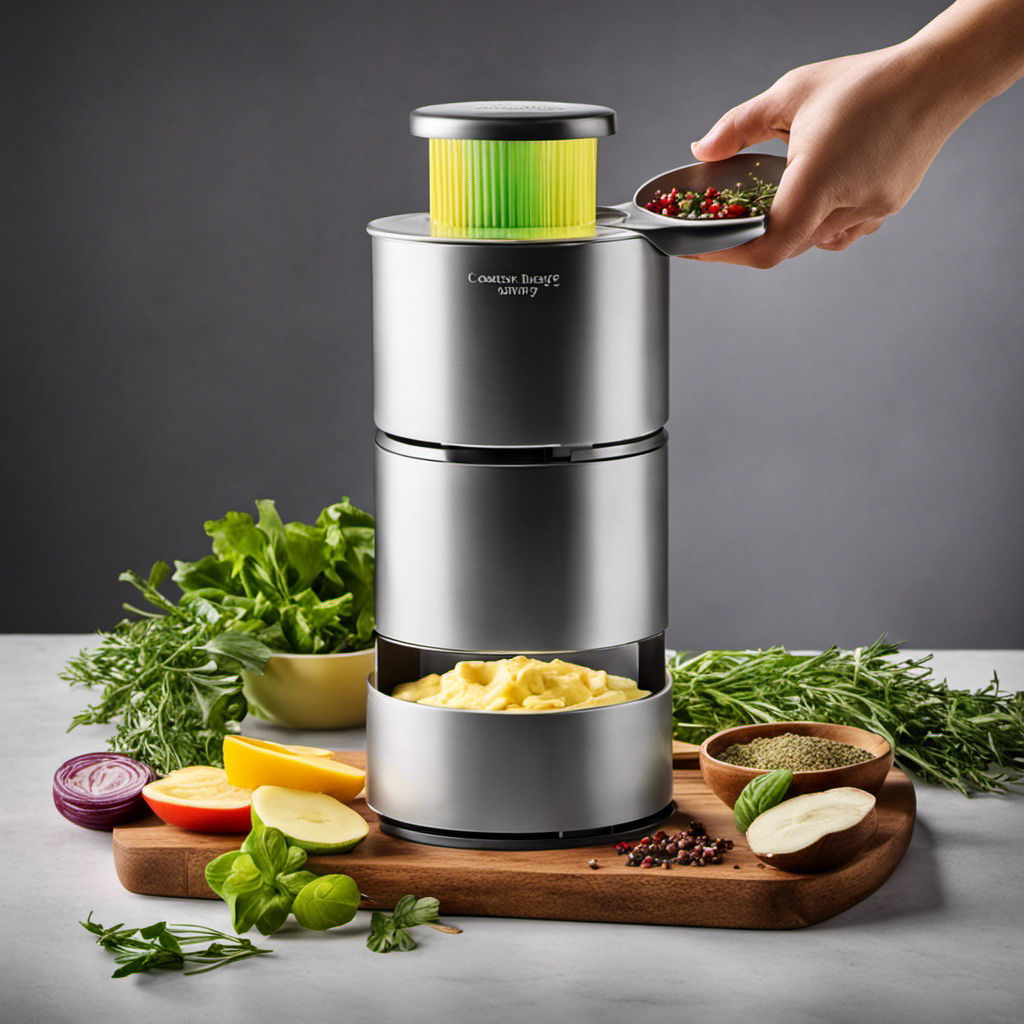Did you realize that homemade popcorn is not only a tasty snack, but also a healthier choice compared to store-bought alternatives?
In this article, I will guide you through the world of homemade popcorn makers, helping you choose the right amount of oil and butter for that perfect batch.
We’ll explore tips, tricks, and even explore healthier alternatives to oil and butter.
Get ready to elevate your popcorn game and enjoy a guilt-free treat that will have your taste buds begging for more.
Key Takeaways
- There are a wide variety of homemade popcorn makers available on the market, including stovetop, air poppers, and microwave popcorn makers.
- When choosing popcorn kernels, consider preferences between butterfly and mushroom kernels.
- Opt for oils high in monounsaturated fats, such as olive oil or avocado oil, when choosing the right amount of oil for popcorn.
- Butter adds a creamy and indulgent flavor to homemade popcorn, but butter alternatives like coconut oil or olive oil can be used for different dietary preferences.
Types of Homemade Popcorn Makers
There’s a wide variety of homemade popcorn makers available on the market.
When it comes to choosing the right popcorn kernels, it’s important to consider your preferences. If you prefer smaller, tender popcorn, go for the butterfly kernels. But if you like bigger, fluffier popcorn, the mushroom kernels are your best bet.
As for the cooking methods, there are a few options to choose from. The stovetop method is a classic and allows you to control the heat and flavor by adding butter or oil.
Air poppers are a healthier option as they don’t require any oil, but they may lack the buttery taste.
Microwave popcorn makers are quick and convenient, but they often contain added chemicals and preservatives.
Ultimately, the choice of popcorn maker and method depends on your taste preferences and convenience.
Choosing the Right Amount of Oil for Popcorn
It’s important to choose the right amount of oil when making popcorn. Too little and your popcorn may end up dry and tasteless, while too much oil can leave you with greasy and unhealthy popcorn. So, how do you find the perfect balance? Here are some tips to help you enjoy your homemade popcorn:
-
Choosing Healthy Fats:
-
Opt for oils that are high in monounsaturated fats, such as olive oil or avocado oil. These fats are considered healthier options compared to saturated fats.
-
Avoid using hydrogenated oils or trans fats, as they can increase the risk of heart disease and other health issues.
-
Experimenting with Different Oils:
-
Don’t be afraid to try different oils to find your preferred flavor. Coconut oil can lend a sweet and nutty taste, while peanut oil can add a rich and savory note.
-
Consider using flavored oils like truffle oil or chili oil for a unique and exciting popcorn experience.
The Role of Butter in Homemade Popcorn
When it comes to making homemade popcorn, one of the key decisions is whether to use butter or oil. Both have their own unique flavors and textures, making it a tough choice.
Additionally, for those looking for a healthier option or with dietary restrictions, there are also butter alternatives to consider.
Lastly, the quantity of butter used can greatly affect the taste and richness of the popcorn, so finding the right balance is crucial for a satisfying snack.
Butter Vs. Oil
To make your homemade popcorn, you should consider using butter instead of oil. While oil is commonly used for popping corn, butter adds a rich and flavorful taste that enhances the overall popcorn experience.
Here are some reasons why butter is a better choice:
-
Taste: Butter adds a creamy and indulgent flavor to popcorn, making it more enjoyable to eat.
-
Health benefits of oil: While oil is often considered a healthier option, it is important to note that not all oils are created equal. Butter, when used in moderation, can provide essential nutrients like vitamins A, D, and E.
Butter Alternatives
If you’re looking for a different option to enhance the flavor of your popcorn, you might want to consider trying out some butter alternatives. There are plenty of options out there for those who want to skip the traditional butter and still enjoy a tasty bowl of popcorn.
One popular choice is using coconut oil, which adds a subtle tropical flavor to your popcorn. Another option is using olive oil, which gives your popcorn a rich and savory taste. If you’re looking for a vegan popcorn option, you can try using nutritional yeast, which adds a cheesy and nutty flavor.
These butter substitutes not only add a delicious twist to your popcorn, but they also cater to different dietary preferences.
Now that we’ve explored some butter alternatives, let’s move on to discussing the quantity of butter to use in your homemade popcorn.
Butter Quantity
Now that you have explored different butter alternatives, let’s focus on how much butter to add to your popcorn. Finding the right amount of butter is crucial to achieving that perfect balance of flavor and texture. Here are a couple of tips to help you enjoy your popcorn even more:
- Butter vs. Oil
- Butter: Adding melted butter to your popcorn gives it a rich and indulgent flavor. However, be careful not to overdo it, as too much butter can make your popcorn greasy.
- Oil: Some people prefer using oil instead of butter as it provides a lighter and healthier option. Olive oil, coconut oil, or vegetable oil can be used to coat the popped kernels evenly.
Tips for Using Oil and Butter in Popcorn Making
When it comes to making the perfect batch of homemade popcorn, there are a few key points to keep in mind.
First, finding the optimal oil-to-corn ratio is crucial for achieving that perfect crunch.
Additionally, if you’re looking to switch things up and add a different flavor profile to your popcorn, there are plenty of butter alternatives that can do the trick.
And finally, nobody likes soggy popcorn, so I’ll share some tips on how to avoid that disappointing outcome.
Get ready to elevate your popcorn game with these helpful tips and tricks!
Optimal Oil-To-Corn Ratio
To achieve the best flavor and texture, it’s crucial to find the optimal oil-to-corn ratio for your homemade popcorn maker. The right amount of oil ensures that the popcorn pops evenly and doesn’t turn out too greasy or dry.
Here are some tips to help you find the perfect balance:
- Start with a ratio of 1 tablespoon of oil for every 1/4 cup of popcorn kernels.
- Adjust the ratio based on your personal preference and the size of your popcorn maker.
- For a lighter, healthier option, you can reduce the amount of oil.
- If you prefer a richer taste, you can increase the oil slightly.
Remember to preheat your popcorn maker to the optimal cooking temperature, usually around 400°F, before adding the oil and kernels.
Don’t be afraid to experiment with flavored oils to add a unique twist to your popcorn. The possibilities are endless, from truffle oil to chili-infused oil.
Happy popping!
Butter Alternatives for Flavor
Finding a suitable alternative for butter can enhance the flavor of your popcorn. As a vegan popcorn lover, I’ve discovered some delicious butter substitutes that add a burst of flavor to my movie night snack.
One of my favorite alternatives is using nutritional yeast. It has a cheesy and savory taste that pairs perfectly with popcorn.
Another option is coconut oil, which adds a subtle sweetness.
I also love experimenting with different herbs and spices in my popcorn seasoning. Adding a sprinkle of garlic powder, paprika, or even a dash of cayenne pepper can give your popcorn a unique and exciting flavor.
Avoiding Soggy Popcorn
Now that we’ve discussed butter alternatives for flavoring our popcorn, let’s move on to another important aspect of making delicious homemade popcorn – avoiding soggy popcorn. Nobody likes biting into a kernel only to find it soft and mushy. Here are some tips to ensure your popcorn is light, crispy, and perfectly popped:
-
Use the right amount of oil or butter: Too much oil can make the popcorn greasy and soggy. Stick to the recommended amount or use an air popper for a healthier option.
-
Pop the kernels at the right temperature: Heating the oil or butter too high can burn the popcorn, resulting in an unpleasant taste. Maintain a moderate heat to achieve the ideal golden brown color.
-
Try popcorn seasonings: Enhance the flavor of your popcorn by adding popcorn seasonings such as cheese, caramel, or various spices. They can give your popcorn a delicious kick without making it soggy.
Healthier Alternatives to Oil and Butter in Popcorn
There’s a variety of healthier alternatives to oil and butter that you can use in your homemade popcorn maker.
When it comes to making popcorn, it’s important to consider the health benefits. Air popped popcorn is a great option because it contains fewer calories and fat than popcorn made with oil or butter.
But just because you’re opting for a healthier choice doesn’t mean you have to sacrifice flavor. Instead of using oil or butter, try using herbs and spices to add a burst of flavor to your popcorn.
You can experiment with different combinations like garlic and Parmesan, chili powder and lime, or even cinnamon and sugar. These alternatives not only add taste, but also provide additional health benefits.
Enhancing Flavor With Seasonings and Spices
Enhancing the flavor of your popcorn is easy when you experiment with different seasonings and spices. Adding popcorn seasonings can take your movie night snack to a whole new level.
Here are some creative popcorn flavor combinations to try:
-
Sweet and Savory:
-
Caramel and sea salt
-
Honey and chili powder
-
Spicy and Tangy:
-
Sriracha and lime zest
-
Cajun seasoning and lemon pepper
These combinations will give your popcorn a burst of flavor and keep you coming back for more. Don’t be afraid to get creative and mix different seasonings together. You can even try adding some grated cheese or nutritional yeast for a cheesy twist.
Common Mistakes to Avoid When Using Oil and Butter in Popcorn Making
Using too much oil or butter in popcorn making can result in greasy and soggy popcorn. It’s a common mistake that many people make when trying to achieve that perfect balance of flavor and texture.
The key is to use just enough oil or butter to coat the popcorn kernels evenly without overwhelming them. Another mistake to avoid is using flavored oils or butter substitutes, as they can alter the taste and texture of the popcorn. Stick to plain, unsalted butter or a neutral oil like canola or vegetable oil.
However, if you find yourself with leftover butter, there are alternative uses for it in cooking. You can use it to sauté vegetables, spread it on toast, or even make a delicious butter sauce for pasta.
Frequently Asked Questions
Can I Use a Microwave Popcorn Maker Instead of a Homemade Popcorn Maker?
Yes, you can use a microwave popcorn maker instead of a homemade popcorn maker. However, homemade popcorn has the benefit of being customizable and healthier, as you can control the amount of oil and butter used.
How Long Does It Take to Make Popcorn Using a Homemade Popcorn Maker?
Making popcorn with a homemade popcorn maker is a quick and easy process. It only takes a few minutes to cook, and you can customize it with your favorite seasonings. Yum!
What Are Some Alternative Ingredients I Can Use Instead of Butter in Homemade Popcorn?
When making homemade popcorn, there are alternative ingredients you can use instead of butter. These options not only add flavor but also offer various health benefits, making your popcorn a delicious and nutritious snack.
Can I Use Coconut Oil Instead of Vegetable Oil in Homemade Popcorn Making?
Coconut oil can be a healthy alternative to vegetable oil in homemade popcorn making. It offers various benefits like boosting metabolism and improving heart health. Vegetable oil, on the other hand, may have health risks due to its high omega-6 fatty acid content.
What Are Some Common Mistakes to Avoid When Using Oil and Butter in Popcorn Making?
When it comes to popcorn making, there are a few common mistakes to avoid. One is measuring too much or too little oil and butter. Another is not properly heating the oil/butter before adding the popcorn kernels.
Conclusion
In conclusion, making homemade popcorn can be a fun and delicious way to enjoy a movie night or a snack.
By choosing the right amount of oil and butter, you can create perfectly crispy and flavorful popcorn.
Did you know that popcorn is a popular snack in the United States, with Americans consuming over 15 billion quarts of popcorn each year?
With the right techniques and a bit of experimentation, you can create your own unique and delicious popcorn creations.
So grab your popcorn maker and start popping!









